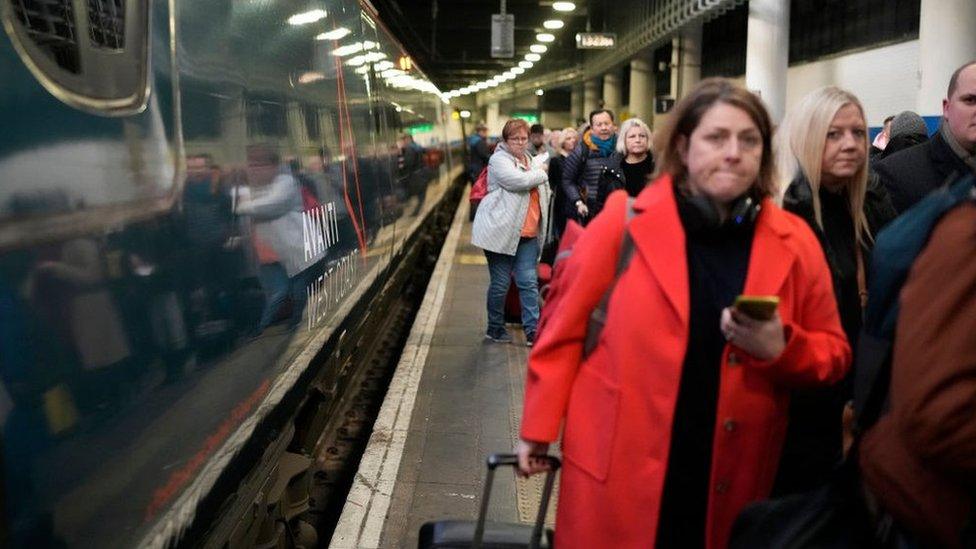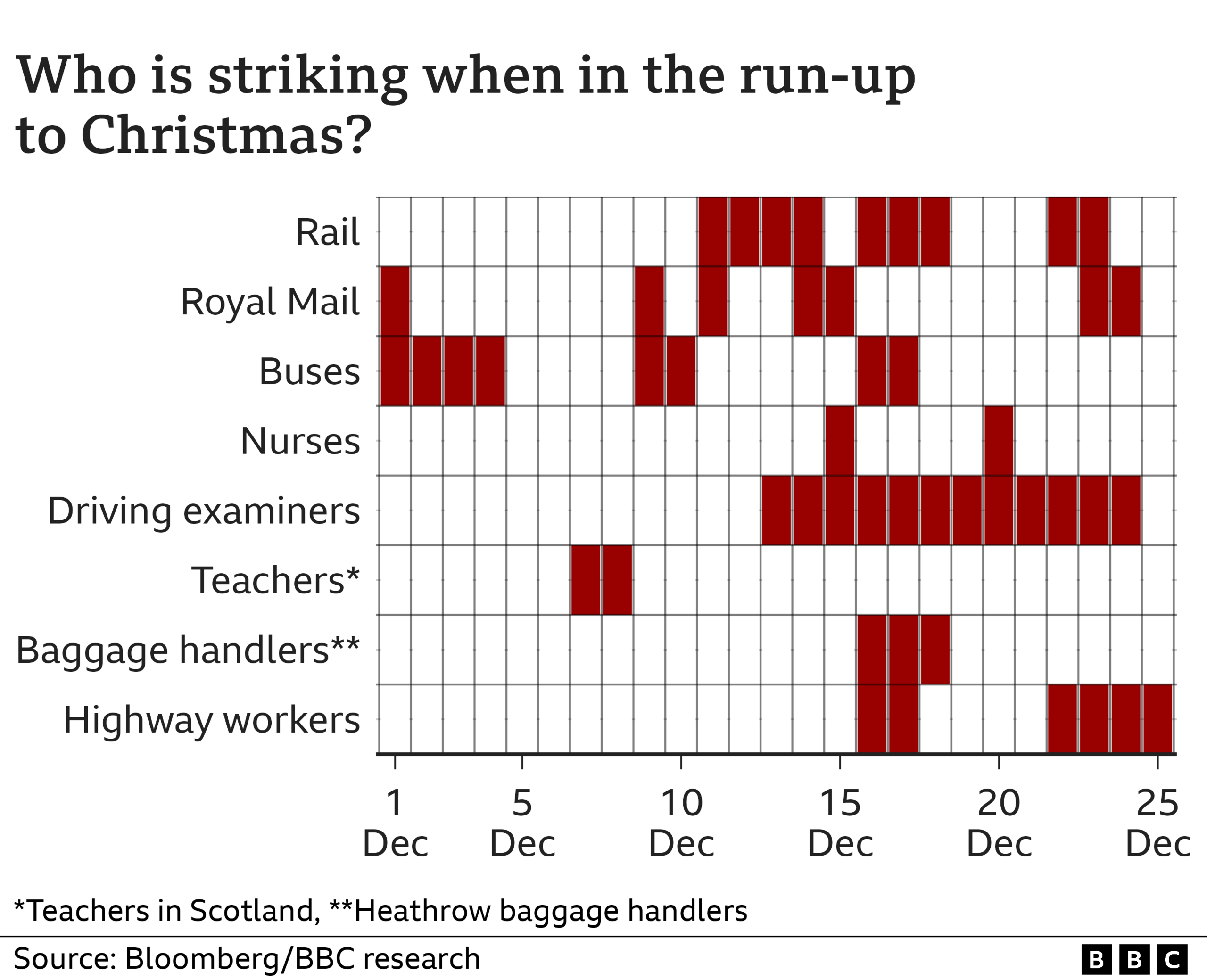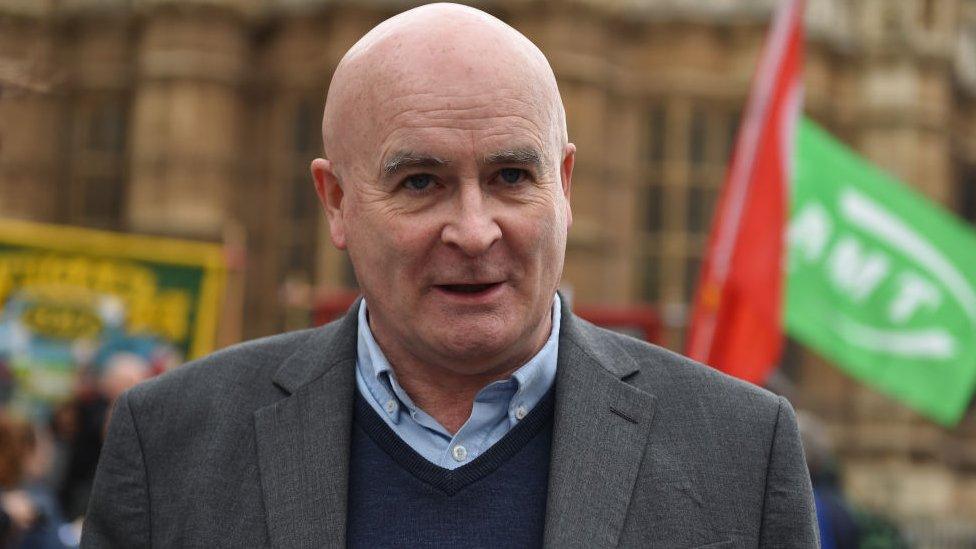Train strikes: RMT union rejects offer to stop Christmas walkouts
- Published
- comments

Talks aimed at averting train strikes before Christmas are expected to continue on Monday, after the RMT union rejected an initial offer by the group representing train companies.
The latest round of strikes by union members at 14 train firms and Network Rail is due to begin in eight days.
The Rail Delivery Group (RDG) said its offer would allow for a 4% pay rise this year and another 4% next year.
But the RMT said the offer did not meet its criteria for pay or conditions.
Industrial action is currently due to take place across four 48-hour periods: 13-14 December, 16-17 December, 3-4 January and 6-7 January.
Industry sources have said that if the strikes are to be called off, this needs to happen by the end of Monday to avoid disruption for passengers.
The RDG - which represents the 14 train operators - set out a number of proposed changes to working practices which it said would help to fund a pay rise for staff of 4% this year, backdated to the beginning of the financial year, followed by another 4% next year.
These include repurposing or closing ticket offices, with staff having new "multi-skilled" roles and Sunday working where it is not in place already.
Other proposals by the RDG to "secure the future of the industry" included drivers operating the train doors in more areas, although it insists guards would be still be on board.
The group also proposed the use of part-time contracts and flexible working patterns, which it said would help bring in a more diverse workforce who could fit in shifts around other commitments. There would be a guarantee of no compulsory redundancies until April 2024 too.
The RDG called on the union to avoid "upsetting the travel plans of millions and cause real hardship for businesses which depend on Christmas custom".
However, the RMT union's general secretary Mick Lynch said the proposals would not be acceptable to its members.
"We have rejected this offer as it does not meet any of our criteria for securing a settlement on long-term job security, a decent pay rise and protecting working conditions," he said.
Mr Lynch added that if the plan was implemented, it would "not only mean the loss of thousands of jobs" because of the closure of ticket offices, for example, but also the use of "unsafe practices" like driver-only operated trains.
However, the RDG said driver-only operated trains were already used on 45% of services and "will not compromise passenger safety".

How will the strikes affect you? Share your experiences.
WhatsApp: +44 7756 165803, external
Tweet: @BBC_HaveYourSay, external
Please read our terms & conditions and privacy policy

Transport Secretary Mark Harper described the RMT's rejection as "incredibly disappointing".
He added the government would continue to play its part in facilitating talks between the unions and employers.
'It's just a nightmare'

John Junior, who regularly takes the train from Manchester to London, said he was planning to visit friends in the capital on 17 December but is now considering other options.
"Everyone has the right to go on strike but not over the festive period. That's disgraceful. It's more stress on everyone," the IT consultant said.
The 34-year-old said he believes rail workers deserve a pay rise, but said the strikes made him worry a bit about the reliability of booking trains, having been hit by disruption on the Avanti West Coast line.
"It's just a nightmare - trains cancelled, delayed.
"Something needs to be done. I think the government needs to step in," he added.
The RDG offer is separate to negotiations with Network Rail, which maintains the railways throughout Britain and employs signallers and maintenance workers - about half of the workers in the dispute.
On Sunday, Network Rail made what it described as its "best and final" offer to its staff, which included a 5% pay rise this year and 4% next year, and no compulsory redundancies for workers in its general grades and controllers until 31 January 2025.
The RMT's national executive committee will consider Network Rail's proposal on Monday.
The rail industry is not the only sector to face strike action, and more workers are expected to walk out this month, as demands grow for better working conditions and pay increases in line with rising prices.
Royal Mail is set to be hit by a series of one-day strikes in December, and as a result it has asked people to post Christmas mail earlier than usual.

Hospitality bosses have raised concerns that if rail strikes go ahead in the upcoming weeks, pubs, restaurants and cafes will be severely affected during what is usually the busiest time of the year.
UK Hospitality recently warned that the strike action will cost the sector about £1.5bn in lost sales., external
Some 40,000 workers are expected to walk out and there is likely to be disruption in the days around the strikes due to trains not being in the right places.
The rail industry is under pressure to save money after the pandemic left a hole in its finances, and bosses say reforms are needed to modernise the railway and make pay rises affordable.
The RDG said there would be opportunities for redeployment and voluntary redundancy programmes for those rail workers who wished to leave.
The proposals it set out would have had to go to local representatives for approval.
Related topics
- Published2 December 2022

- Published1 August 2023

- Published9 May 2024
